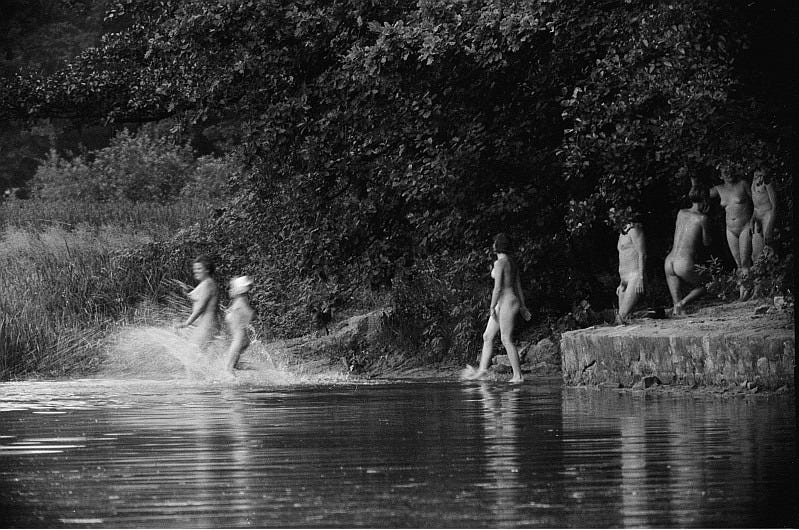FKK in Germany: Where Nudity Is Normal — and Privacy Sacred
Germany is a nation of contradictions—celebrating nudity yet guarding privacy
One of Germany's many cultural contradictions can be seen at the beach this summer, where many people are happy to walk around naked. I've also seen it sunbathing at lakes or on the lawn at Munich's Englischer Garten.
The famous FKK (Freikörperkultur or free body culture) champions the principle of public authenticity: not needing to hide anything, save for perhaps your laptop should there be wild boars roaming around.
FKK is practised in a culture which is famously reserved and privacy sensitive. The same person confidently sunbathing at the Baltic Sea in their birthday suit may barely make eye contact in the hallway or use a cash-only transaction to avoid leaving a digital footprint. You’re more likely to see your neighbour’s unfiltered backside than hear what they earn at work. Discussing salaries is like talking about Voldemort—it simply isn’t done.
FKK is just one of the many walking paradoxes I've noticed in 13 years of living in Germany, a structural society full of spontaneity. The Bundesrepublik is as well known for its punctual people as it is for its plodding paperwork and unpredictability.
Ordnung reigns supreme, but not when it comes to catching a Deutsche Bahn train on time without divine intervention, or getting your hands on an Anmeldung (residence registration) or work permit in a few simple steps.
Minimalist designs, maximalist processes
The country with the third largest economy in the world by nominal GDP undoubtedly builds BMWs with robotic precision, and boasts a Mittelstand which is a global leader in numerous niche markets such as bottling machines or optical sensors. It’s behind Bauhaus, the school of practical design that inspired modern architecture around the globe, and even the sturdy Miele dishwasher built (in theory) to last some 20 years.
So it often baffles me that, in a society focused on making products and processes more robust and efficient, getting things done can take on a Kafkaesque pace. German engineering is renowned worldwide, with “Made in Germany” an affixed symbol of pride, but public construction projects are notorious for delays and cost overruns. The Berlin Brandenburg Airport (BER) opened nearly a decade late, and some 5 billion euros over its initial budget. The Elbphilharmonie concert hall in Hamburg ended up costing 900 million euros instead of the planned 80 million. And the Stuttgart 21 Rail Project, first presented in 1994, is finally set to be completed in September 2026 after years of delays.
This inefficiency often trickles down to daily life. I needed to show up at the Bürgeramt just to register my new address after sticking it out for six weeks to secure the next available appointment. In my native California (and I assume in most of the industrialized world), you can simply submit an online form.
Yes, the high-tech nation of industrial systems and fancy dishwashers has a fondness for low-tech. World-class engineering often meets outdated websites (if any at all) and 1990s era appliances. Bureaucrats often opt for analogue signatures or the beloved fax machine, still used by 80 percent of German companies as of 2023. It’s particularly popular in schools, government offices, and medical practices, as I had the pleasure to experience the other week.
I brought my daughter to a dentist appointment, only to realize I’d forgotten my wallet with her health insurance card in another bag at home. “No problem, just have your health insurer fax us a confirmation that she’s insured,” assured the receptionist. I called them right away, but the faulty fax machine failed to deliver the document after several tries.
It did not matter that the insurance representative offered to give a guarantee over the phone that we were indeed versichert. Nor that she could quickly send the letter via email, which the Praxis also wouldn’t accept. Nope, no fax, no teeth cleaning by a dinosaur puppet.
Green gas guzzlers
Living here, it’s easy to see that Germans have a very set way of doing things, from relying on supposedly more secure faxes, to standing silently in lifts, to recycling religiously. Germans have one of the highest Mülltrennung rates in the world at 69 percent for municipal waste, and meticulously sort their waste into between 5 and 7 multi-coloured bins. Yet the system is so complex that many Germans admit to doing it wrong or just giving up.
And then there’s Germany’s green paradox on a grander scale. On the one hand, the country is a poster child for environmental innovation. Under the Energiewende (energy transition), it has poured billions into wind and solar—despite the absence of the latter during a noticeable chunk of the year. However, the Bundesrepublik is still burning dirty brown coal, which it has needed to rely more heavily on after its nuclear power phase out in April 2023.
This pledge to anti-nuclear purity also hasn’t stopped Germany from sometimes importing electricity from neighbouring France, which itself relies heavily on nuclear energy. France’s nuclear exports to its “nuclear free” neighbour have even increased, with the country doubling the amount it sent to Germany in 2024.
An increasing number of German cities furthermore pride themselves on creating low-emission zones, pedestrianizing inner-city streets, and building bike superhighways. At the same time, many Germans love their cars and boldly blaze down the Autobahn, which lacks a speed limit on large sections. While many experts argue that introducing a national speed cap on the Autobahn would trim emissions and save lives, the mere suggestion regularly leads to public outcry. Many can’t stomach the idea of losing a part of their identity and lifestyle.
Love of rules and personal freedoms
The nation of fast-driving car lovers will accept rules, but not when they impede their personal freedoms. Sitting in the terraces of cafes in summer, I often simultaneously catch a whiff of fresh air and cigarette smoke. That’s a minor inconvenience compared to a Kneipe in Berlin-Neukölln, the only places hazier than a steam room in one of the city’s famous saunas.
Germany prides itself on being health-conscious. This is the land of organic farmers’ markets, enthusiastic weekend hikes through the forest, and a strict set of health rules and regulations, especially during the Covid-19 pandemic. Yet in many bars and even train stations at night you’ll find yourself swimming in a cloud of cigarette smoke, as if the 1980s never ended.
While smoking rates have declined, Germany still lags behind many of its European neighbours when it comes to restrictions, with tobacco taxes among the lowest in the EU.
Indoor smoking bans exist, but with enough loopholes to keep the cigarette industry happy. Cigarette vending machines complete with ID scanners still stand on many street corners, making buying a pack almost as easy as purchasing a Brezel at your local Bäckerei. I’ve seen smokers lighting up at the cancer ward of a hospital, and on the periphery of playgrounds, once with a reusable water bottle and yoga mat.
Germany may be a land of paradoxes, where precision-built trains often arrive late, nudists bare everything but their personal data, and health-conscious yogis light up before a class. But somehow, all of these contradictions exist in a way that’s strangely, unmistakably German.





Great first contribution by Rachael, I as a born German was smiling and laughing out loud all the way through. So true! Though I have never indulged in FKK, and I never would. Quite apart from being too prudish, it reminds me too much of the 1920s Jugendbewegung and the Nazis, who embraced it enthusiastically. No, not the Nazis! I hear you groan. Yes, but so much in the German paradox can be found in every aspect even of German history. As Thomas Mann once pointed out, I think in Doktor Faustus, Nazism started as a perverted form of German Romanticism. It would go beyond a short comment to delve deeper into this, but it’s a good starting point to understand many of the contradictions Rachael describes.
Feels like an article casually written for a school magazine. How is allowing nudity the same as celebrating nudity, and how does it contribute to the narrative that Germany is a nation of contradictions?
The sun is not 'absent for a notable chunk of the year', and in any case, how does that make solar an unattractive investment proposition?